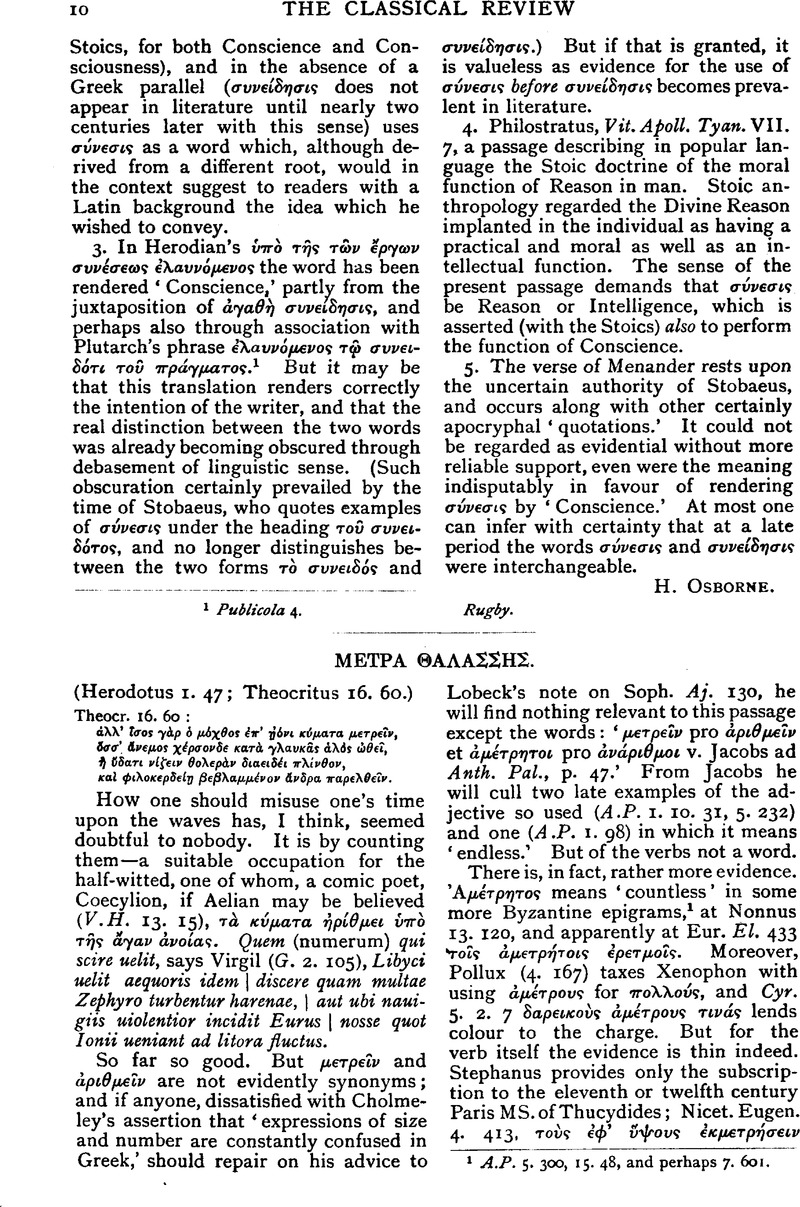Article contents
ΜΕΤΡΑ ΖΑΛΑΣΣΗΣ
Published online by Cambridge University Press: 27 October 2009
Abstract

Information
- Type
- Review Article
- Information
- Copyright
- Copyright © The Classical Association 1931
References
page 10 note 1 A.P. 5. 300, 15. 48, and perhaps 7. 601.
page 11 note 1 The lyric and the comic poet wrangle over this treasure: Kock 1, p. 763, Bergk4 3, p. 189.
page 11 note 2 E.g., Eur. Tr. 620, Theocr. 15. 45.
page 11 note 3 Anacreont. 13 (32), ![]() at least keeps the shore out of view.
at least keeps the shore out of view.
page 11 note 4 Greg. Naz. or. 28, p. 517: Migne 36, p. 64. leave to others to determine the relations between this phrase, ![]() (Paroem. Gr. 1. 446, Leutsch), and the child who asks St. Augustine pulasne breui immittere uasculo mare totum? (Molanus, de Hist. Imag. 3, ch. 36)
(Paroem. Gr. 1. 446, Leutsch), and the child who asks St. Augustine pulasne breui immittere uasculo mare totum? (Molanus, de Hist. Imag. 3, ch. 36)
page 12 note 1 Jebb writes ‘probably = spatia, not as “distances,” but as the “terms” or spaces of time between the risings and settings, etc., as measuring the seasons’; cf. Arist. de mundo 397a 9, ![]() .
.
page 12 note 2 Mediterranean Pilot, Vol. IV., p.11.
page 12 note 3 Ib., p. 10.
page 12 note 4 Ib., p. 10.
page 12 note 5 ‘Aμετρηϒος as applied to ρ (Ar. Nub. 264) no doubt means ‘boundless’: cf. Clem. Al. Paed. 2, p. 164, ![]() . The adjective is applied to the sea also at A.P. 9. 34 (Antiphilus) and 36 (Secundus). Either meaning would do, and such poets as these take their adjectives from the Gradus.
. The adjective is applied to the sea also at A.P. 9. 34 (Antiphilus) and 36 (Secundus). Either meaning would do, and such poets as these take their adjectives from the Gradus.
page 12 note 6 I am not concerned with 1. 61, and have therefore printed, with Wilamowitz, Bücheler's Kar, for the μετ of the MSS., which presents wind and sea as joint agents in the production of waves. Mετ c. gen., though unpopular with Alexandrian poets, occurs at 28. 21; and it may be defensible here, but the parallels adduced by Vahlen (Hermes 33. 248) do not advance us much.
- 1
- Cited by

